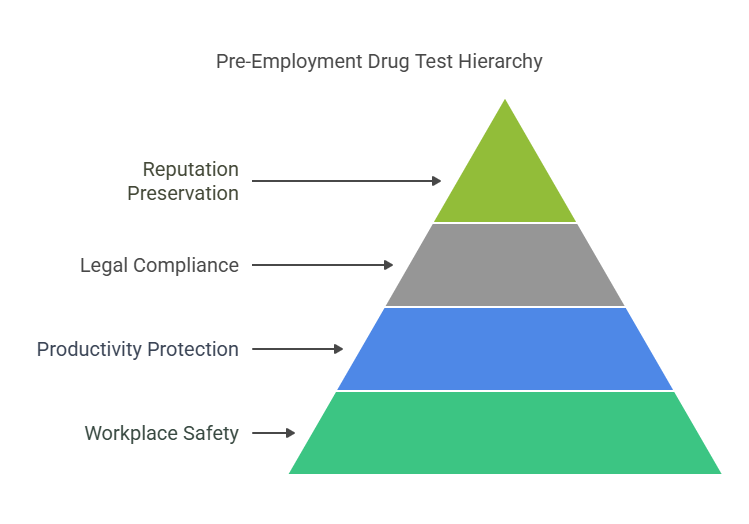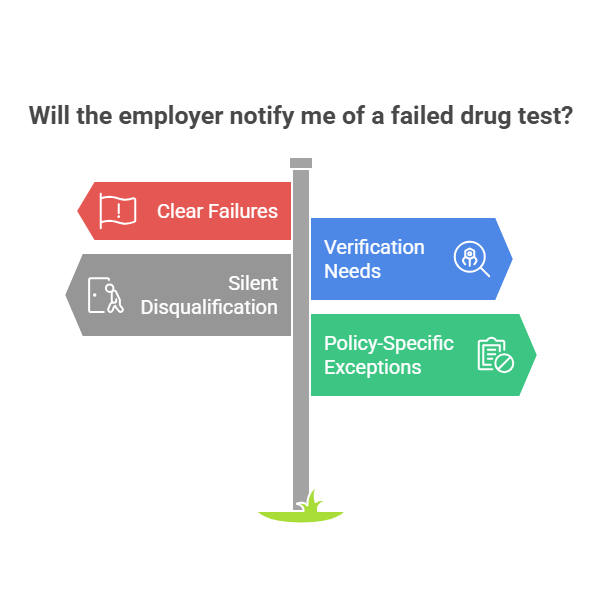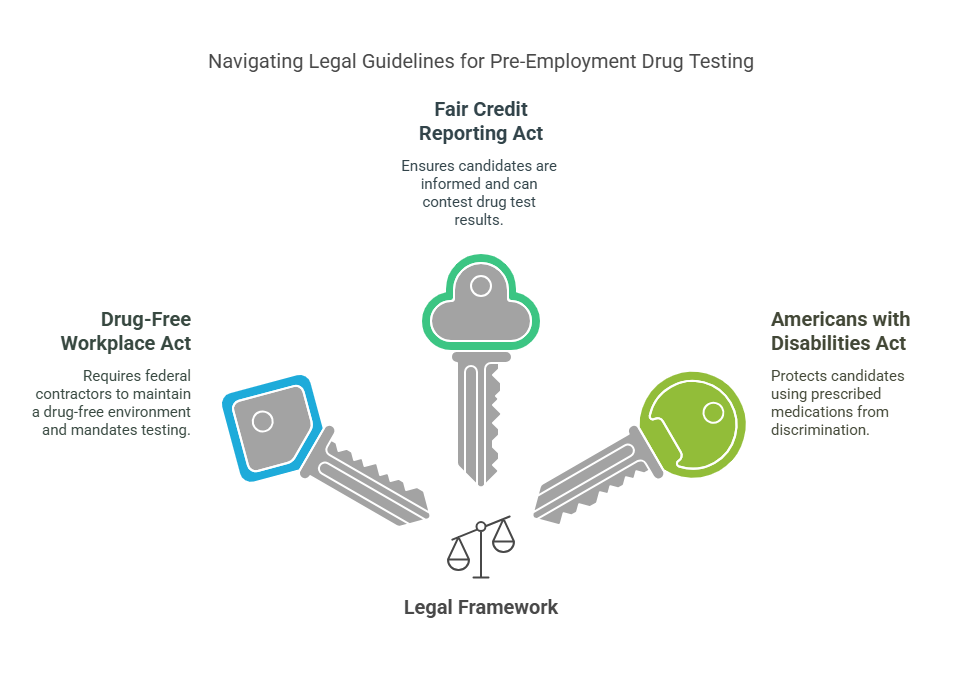Insights on Employer Communication After a Failed Drug Test
The Importance of Drug Testing in Pre-Employment Screening
In today’s competitive job market, pre-employment drug testing has become a standard practice for many employers. These tests help companies ensure that they are hiring reliable and responsible candidates who align with their organizational values and workplace safety standards. By screening for drug use, employers reduce risks associated with impaired performance, accidents, and absenteeism.
Industries such as healthcare, transportation, and manufacturing often mandate drug testing to comply with federal and state regulations. In these fields, even minor lapses in judgment caused by drug or alcohol use could have severe consequences, making pre-employment drug screening critical.
What Are Pre-Employment Drug Tests?

A pre-employment drug test is a screening process used to detect the presence of illegal substances, prescription medications, or alcohol in a candidate’s system. These tests are typically conducted after a conditional job offer has been extended, but before the candidate starts work.
Purpose of Pre-Employment Drug Tests
- Ensuring Workplace Safety: Prevent accidents caused by impaired employees.
- Protecting Productivity: Avoid issues such as absenteeism and reduced work efficiency.
- Legal Compliance: Meet regulatory requirements, especially in federally regulated industries like aviation, trucking, and defense.
- Preserving Company Reputation: Demonstrate a commitment to a drug-free workplace, which is appealing to customers and stakeholders alike.
Common Substances Tested in Pre-Employment Drug Screens
Employers typically test for a range of substances, including:
- Illegal Drugs: Marijuana, cocaine, methamphetamine, heroin.
- Prescription Drugs: Opioids, amphetamines, benzodiazepines (when misused or abused).
- Alcohol: In safety-sensitive roles, alcohol tests may be included to ensure on-the-job sobriety.
Most drug tests use one or more of the following methods:
- Urine Tests: The most common method, used for detecting recent drug use.
- Blood Tests: Typically used for alcohol or immediate drug detection.
- Hair Tests: Provides a longer detection window for substance use history.
- Saliva Tests: Detects very recent drug use, often within a few hours.
Why Companies Conduct Drug Tests
Employers conduct drug tests for several reasons, including:
- Maintaining Safety Standards: Especially critical in industries involving machinery, driving, or public health.
- Mitigating Liability Risks: Drug-free workplaces reduce the likelihood of workplace accidents and associated legal claims.
- Ensuring Regulatory Compliance: Many industries, such as those regulated by the Department of Transportation (DOT), require mandatory drug testing as part of the hiring process.
- Promoting a Positive Workplace Culture: Employees are more likely to feel secure and valued in a drug-free environment.
Consequences of Failing a Pre-Employment Drug Test
Failing a pre-employment drug test can have significant repercussions, including:
- Job Offer Revocation: In most cases, a failed drug test results in the immediate withdrawal of a conditional job offer.
- Industry Restrictions: Certain industries may permanently disqualify candidates with a history of drug use.
- Damage to Professional Reputation: While drug test results are typically confidential, repeated failures could limit future job prospects.
Do Employers Call If You Fail a Drug Test?

One of the most common questions candidates ask is whether employers notify them of a failed drug test. The answer varies depending on the employer’s policies, the testing method, and state or federal regulations.
Scenarios Where Employers May Notify Candidates:
- Clear Failures: If the results show unequivocal drug use, employers may contact candidates to inform them of their disqualification.
- Verification Needs: In cases where prescription medications might have caused a positive result, employers or medical review officers (MROs) might call the candidate for clarification.
Scenarios Where Employers May Not Notify Candidates:
- Silent Disqualification: Some companies choose not to notify candidates of a failed test, simply rescinding the job offer without further communication.
- Policy-Specific Exceptions: Employers in jurisdictions with no legal obligation to inform candidates might avoid the conversation altogether.
Steps After Failing a Pre-Employment Drug Test
Failing a pre-employment drug test can be an unexpected and stressful experience. The steps that follow often depend on the employer’s policies, the circumstances surrounding the results, and legal requirements. Below is a typical process that occurs after a failed drug test:
1. Notification of Results
- By the Employer or Testing Facility: Employers may notify candidates directly if their results are positive. Some companies rely on third-party testing facilities to handle this communication.
- Medical Review Officer (MRO) Review: Before reporting a result as a “fail,” an MRO will review the test to verify whether the substance detected might be due to a legitimate medical prescription.
2. Employer’s Decision
- Rescinding the Job Offer: Most employers adhere to a zero-tolerance policy, resulting in the immediate withdrawal of the conditional job offer.
- Follow-Up Communication: In some cases, employers may contact candidates to discuss the results or request documentation if prescription drugs could explain the positive test.
- No Communication: Some employers may choose to forgo notifying candidates, simply moving forward with other applicants.
3. Documentation and Recordkeeping
Employers are required to keep records of pre-employment drug test results to comply with industry regulations. However, these records are typically confidential and not shared with future employers unless explicitly authorized by the candidate.
4. Candidate Disqualification
Failing a drug test often disqualifies a candidate from the position they applied for. In industries with strict regulations, such as transportation or healthcare, this disqualification may extend to future roles as well.
Factors Determining Whether Employers Call Candidates
Whether an employer contacts a candidate after a failed drug test depends on several factors:
1. Company Policies
- Transparent Policies: Some employers outline their drug-testing policies clearly in job postings or onboarding documents. In such cases, candidates are often notified if they fail a test.
- Strict Zero-Tolerance Policies: Companies with zero-tolerance policies may opt not to contact candidates and simply disqualify them.
2. State and Federal Laws
- Certain states require employers to notify candidates of failed drug test results and provide an opportunity to dispute them.
- The Fair Credit Reporting Act (FCRA) mandates that candidates be informed if their drug test results impact the hiring decision, especially if a third-party agency conducted the test.
3. Test Results and Context
- Clear-Cut Failures: Employers are less likely to contact candidates if the results indicate clear use of illegal substances.
- Prescription Drug Use: If a failed test is due to prescribed medications, employers or MROs may reach out to verify the legitimacy of the prescription.
Impact on Job Offers and Employment Opportunities
Failing a pre-employment drug test can significantly impact a candidate’s job prospects, depending on the industry and the employer’s policies.
1. Rescinded Job Offers
This is the most common outcome of failing a drug test. Employers may rescind conditional job offers to maintain workplace safety and compliance with their drug-free policies.
2. Blacklisting in Certain Industries
In federally regulated industries, such as aviation or trucking, a failed drug test can make it difficult or impossible to secure future employment. Federal agencies like the Department of Transportation (DOT) maintain strict drug-testing requirements for these roles.
3. Limited Employment Opportunities
Some employers may view a failed drug test as a red flag, even if it resulted from an isolated incident. This can lead to a narrower range of job opportunities, particularly in industries prioritizing safety and compliance.
How Employers Handle Prescription Drug Use
A positive result due to prescription medication is treated differently from illicit drug use. If an MRO confirms the presence of a legitimate prescription, employers may consider the following:
- Job-Specific Requirements: Employers may evaluate whether the medication could impair job performance or pose safety risks.
- Reasonable Accommodations: Under the Americans with Disabilities Act (ADA), employers may need to provide accommodations for candidates taking prescribed medications.
Exact Background Checks: Your Trusted Partner in Employment Screening
At Exact Background Checks, we provide comprehensive, accurate, and compliant employment screening services to help employers make informed hiring decisions. Our services include:
- Reliable Drug Testing: Ensure workplace safety with accurate and timely drug test results.
- Comprehensive Background Reports: From criminal records to employment history, we deliver thorough and legally compliant checks.
- Customizable Screening Solutions: Tailored to meet the unique needs of your organization.
Our team of experts ensures that employers remain compliant with state and federal laws while maintaining professionalism and confidentiality throughout the hiring process.
Quick Reference Table: Pre-Employment Drug Testing Insights
| Substance Tested | Reason for Positive Result | Employer Actions |
|---|---|---|
| Marijuana | Recreational or medicinal use | Rescind offer, follow-up for medical proof |
| Cocaine | Illicit use | Immediate disqualification |
| Opioids | Misuse of prescription drugs | Verification of prescription |
| Amphetamines | Prescription or illegal use | Documentation request |
| Alcohol | High BAC in safety-sensitive roles | Disqualification or retest |
Legal Aspects of Pre-Employment Drug Testing

Employers must follow specific legal guidelines when conducting pre-employment drug tests to ensure fairness and compliance. These laws vary by jurisdiction but share some common principles aimed at protecting both employers and candidates.
Federal Laws Governing Drug Testing
- Drug-Free Workplace Act (DFWA)
- Requires federal contractors and grantees to maintain a drug-free workplace.
- Mandates drug testing for employees working under federal contracts.
- Fair Credit Reporting Act (FCRA)
- Applies when a third-party agency conducts drug testing.
- Requires employers to notify candidates in writing if the results influence hiring decisions.
- Grants candidates the right to review and dispute the results.
- Americans with Disabilities Act (ADA)
- Protects candidates using prescribed medications for disabilities.
- Employers cannot disqualify candidates solely based on medication use unless it poses a direct threat to workplace safety.
State-Specific Drug Testing Laws
Some states impose stricter regulations on pre-employment drug testing:
- California: Employers must provide clear notice of drug testing requirements and ensure tests are non-discriminatory.
- New York: Restrictions on testing for marijuana use, except in safety-sensitive industries.
- Florida: Employers can implement a drug-free workplace program to qualify for workers’ compensation discounts.
Candidates should familiarize themselves with the laws in their state to understand their rights and obligations.
Rights of Job Applicants
- Right to Notification
- Candidates must be informed in advance about pre-employment drug testing policies.
- Right to Dispute Results
- Applicants can challenge false-positive results and request a retest.
- Confidentiality
- Employers must handle drug test results confidentially and share them only with authorized personnel.
- Reasonable Accommodations
- Employers are required to accommodate legitimate medical prescriptions under the ADA unless it creates an undue hardship.
FAQs: Addressing Common Concerns About Drug Testing
Conclusion
Failing a pre-employment drug test can be a challenging experience, but understanding the process and your rights can help you navigate the situation with confidence. Employers conduct these tests to ensure workplace safety, productivity, and compliance with industry regulations.
Key takeaways from this article include:
- Pre-employment drug tests are standard in many industries and typically test for substances like marijuana, cocaine, and opioids.
- Failing a drug test can result in the withdrawal of a job offer, though employers may contact candidates in some cases for clarification or documentation.
- Federal and state laws, such as the FCRA and ADA, protect the rights of job applicants and ensure fair testing practices.
For employers seeking reliable and legally compliant drug testing and background screening services, Exact Background Checks is your trusted partner. Our comprehensive solutions simplify the hiring process, ensuring accuracy, confidentiality, and adherence to all relevant regulations.




This is an incredibly detailed and informative article on the importance of pre-employment drug testing! The breakdown of testing methods, legal considerations, and the impact of failed tests provides valuable insights for both employers and candidates. It’s clear that drug testing is essential for maintaining workplace safety, productivity, and compliance, especially in regulated industries. Thanks for sharing this comprehensive guide!